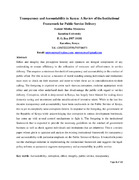Transparency and Accountability in Kenya: A Review of the Institutional Framework for Public Service Delivery
Abstract
Ethics and integrity that presuppose honesty and openness are integral components of any
undertaking to ensure efficiency in the utilization of resources and effectiveness in service
delivery. This requires a minimum threshold of transparency and accountability in the conduct of
public affair. For this to occur, a measure of moral standing among individuals and institutions
must exist to check on their excesses and more so when these act in contradistinction to their
calling. The foregoing is expected to arrest such vices as corruption, enshrine appropriate work
ethics and prevent other underhand deals that disadvantage the public with regard to service
delivery. Corruption, which is deep-rooted in Kenya, has largely been blamed for scaling down
domestic saving and investment and the misallocation of inventive talent. While in the last few
decades transparency and accountability have been catchwords in the Public Service of Kenya,
this is yet to completely tame corruption therein. In response to the foregoing, the government of
the Republic of Kenya while acknowledging that corruption is serious development bottleneck,
has come up with several control mechanisms to fight it. The foregoing is the institutional
framework that is expected to provide the necessary guidelines on the conduct of government
business as well as check against individuals and institutions that act otherwise. This is a review
paper whose gist is to appraise and analyze the existing institutional framework for transparency
and accountability with particular emphasis on the Public Service of Kenya. It henceforth points
out the challenges inherent in implementing the institutional framework and suggests the legalpolicy reforms as panacea to augment transparency and accountability in public service.
